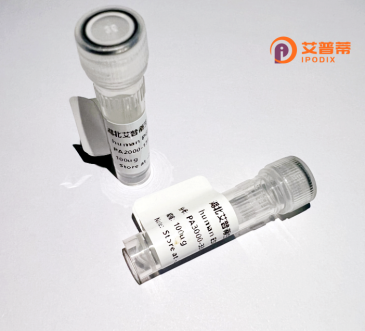
| 纯度 | >90%SDS-PAGE. |
| 种属 | Human |
| 靶点 | CCT3 |
| Uniprot No | P49368 |
| 内毒素 | < 0.01EU/μg |
| 表达宿主 | E.coli |
| 表达区间 | 1-544aa |
| 氨基酸序列 | MGHRPVLVLSQNTKRESGRKVQSGNINAAKTIADIIRTCLGPKSMMKMLLDPMGGIVMTNDGNAILREIQVQHPAAKSMIEISRTQDEEVGDGTTSVIILAGEMLSVAEHFLEQQMHPTVVISAYRKALDDMISTLKKISIPVDISDSDMMLNIINSSITTKAISRWSSLACNIALDAVKMVQFEENGRKEIDIKKYARVEKIPGGIIEDSCVLRGVMINKDVTHPRMRRYIKNPRIVLLDSSLEYKKGESQTDIEITREEDFTRILQMEEEYIQQLCEDIIQLKPDVVITEKGISDLAQHYLMRANITAIRRVRKTDNNRIARACGARIVSRPEELREDDVGTGAGLLEIKKIGDEYFTFITDCKDPKACTILLRGASKEILSEVERNLQDAMQVCRNVLLDPQLVPGGGASEMAVAHALTEKSKAMTGVEQWPYRAVAQALEVIPRTLIQNCGASTIRLLTSLRAKHTQENCETWGVNGETGTLVDMKELGIWEPLAVKLQTYKTAVETAVLLLRIDDIVSGHKKKGDDQSRQGGAPDAGQE |
| 分子量 | 86.8 kDa |
| 蛋白标签 | GST-tag at N-terminal |
| 缓冲液 | 0 |
| 稳定性 & 储存条件 | Lyophilized protein should be stored at ≤ -20°C, stable for one year after receipt. Reconstituted protein solution can be stored at 2-8°C for 2-7 days. Aliquots of reconstituted samples are stable at ≤ -20°C for 3 months. |
| 复溶 | Always centrifuge tubes before opening.Do not mix by vortex or pipetting. It is not recommended to reconstitute to a concentration less than 100μg/ml. Dissolve the lyophilized protein in distilled water. Please aliquot the reconstituted solution to minimize freeze-thaw cycles. |
1. **文献名称**:*CCT3 promotes cell proliferation by suppressing autophagy in hepatocellular carcinoma*
**作者**:Li Y, et al.
**摘要**:研究发现CCT3在肝细胞癌中高表达,通过抑制细胞自噬通路(如PI3K/AKT/mTOR信号)促进肿瘤细胞增殖,提示其作为癌症治疗靶点的潜力。
2. **文献名称**:*Structural insights into substrate recognition by the CCT/TRiC chaperonin γ subunit*
**作者**:Gestaut D, et al.
**摘要**:通过冷冻电镜解析CCT3在分子伴侣复合体中的作用,发现其特异性识别细胞骨架蛋白(如肌动蛋白)的折叠中间态,揭示了CCT3在维持蛋白构象中的关键机制。
3. **文献名称**:*CCT3 interacts with huntingtin aggregates and exacerbates neurodegeneration in Huntington's disease models*
**作者**:Kitamura A, et al.
**摘要**:CCT3被发现与亨廷顿病相关突变蛋白HTT的异常聚集体相互作用,加重神经元功能障碍,表明其在神经退行性疾病病理中的潜在作用。
4. **文献名称**:*CCT3 coordinates with the Hsp90 complex to regulate client protein folding and cancer progression*
**作者**:Zheng S, et al.
**摘要**:研究揭示CCT3与Hsp90分子伴侣协同调控致癌蛋白(如HER2)的正确折叠,其过表达与乳腺癌患者预后不良相关,提出CCT3-Hsp90轴为癌症干预靶标。
Chaperonin-containing TCP-1 subunit gamma (CCT3) is a critical component of the eukaryotic chaperonin complex TRiC/CCT, which facilitates ATP-dependent folding of newly synthesized polypeptides. As one of eight paralogous subunits (CCT1-8) forming a double-ring structure, CCT3 contributes to substrate recognition and binding. Unlike generic chaperones, TRiC specializes in folding structurally complex proteins, including actin, tubulin, and cell cycle regulators. CCT3 directly participates in substrate interactions, with its apical domain likely mediating client-specific conformational adjustments during folding cycles.
Dysregulation of CCT3 correlates with multiple pathologies. Overexpression is observed in various cancers, where it promotes tumor proliferation by stabilizing oncoproteins and activating pathways like PI3K/AKT. Its gene amplification at chromosome 1q21.3 has been linked to poor prognosis in hepatocellular carcinoma and glioblastoma. Additionally, CCT3 interacts with viral proteins, influencing viral replication cycles. While essential for cellular proteostasis, elevated CCT3 expression may serve as a disease biomarker. Recent studies explore its therapeutic targeting through small-molecule inhibitors disrupting TRiC-client interactions. Ongoing research aims to decipher substrate-specific folding mechanisms and pathological roles in protein aggregation diseases.
×